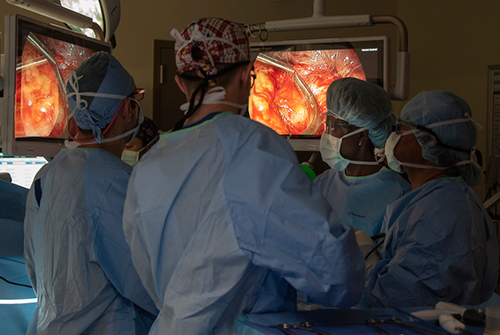Bladder cancer services

Bladder cancer is the second most common urological cancer. Every year, 10,500 new cases are diagnosed and 5,000 patients die of this disease. It is three to four times more common in men than women. It can occur at any age but is generally diagnosed in patients aged 60-80.
The most common risk factor is history of smoking, which increases the risk of this cancer by four times. Patients normally notice blood when they pass urine (haematuria). Presence of visible blood in the urine therefore requires urgent investigation. Repeated urine infections or need to pass urine frequently and urgently are other possible symptoms. The most common tumour is transitional cell carcinoma (TCC). These tumours can affect the inner lining of the kidney and ureter (pipe from kidney to bladder).
Diagnosing and treating bladder cancer
Patients are initially investigated in the one-stop clinic where they have an ultrasound examination of their urinary tract and a flexible cystoscopy (inspection of the bladder using a fibre-optic telescope). Urine samples are sent to the laboratory to look for abnormal cells. The type of cancer you have will determine the treatment you need.
Bladder cancer service at Guy's
Expand the following information areas to find out more about our service.
Team
The bladder cancer team consists of highly experienced urological surgeons, uro-radiologists, uro-pathologists, oncologists, a bladder cancer care nurse specialist, fast track recovery nurse, dietician, physiotherapist and a team of stoma nurses.
The 'Older Persons Assessment Unit' is also available throughout the clinic to assess patients' fitness for surgery (if over 65 years of age), and also to optimise patients medically who are being considered for surgery or radiotherapy.
Clinic
Every Friday morning at Guy's, we hold a clinic for patients with bladder cancer. There is a multi-disciplinary briefing session at the start of the clinic which is attended by all the team members to discuss the clinical information, review each patient's x-rays and histology (tissue samples) and formulate an individual management plan for each patient due to be seen on the day. Thus when the patients are seen in clinic, they will have had the benefit of everyone’s expertise, not just of the person they are seeing.
Complex cases are discussed at a weekly specialist meeting involving surgical teams from other hospitals. We regularly give second opinions to patients from around the country to try and help them understand the disease they have.
Diagnostics
Patients who need a check cystoscopy (telescope examination of the bladder under local anaesthetic) for their follow up can have this done in the clinic so that they do not need to come back for another appointment. The service has access to the modern diagnostic techniques of Photodynamic (Blue Light) Cystoscopy and Narrow Band Imaging.
Treatment/Rehabilitation
There is an outpatient service delivering laser treatment to bladder tumours under local anaesthetic, which allows frail elderly patients to be treated without general anaesthesia and as outpatients. Combination treatment with BCG and electromotively administered (a special device for better penetration) Mitomycin (chemotherapy) into the bladder has been our standard regimen for patients with high-risk superficial bladder cancer which have enabled many patients to avoid removal of the bladder.
New instruments for transurethral resection have been designed by the team in conjunction with Karl Storz for en bloc ‘sand wedge’ resection of removing the bladder tumour without spillage of tumour cells as can happen with conventional loop resection techniques.
The Guy’s team pioneered the robotic cystectomy technique in 2004. Patients for radical cystectomy are offered the option of open or robotic cystectomy approach and choice of all types of urinary diversions (ileal conduit, continent urinary diversion or orthotopic bladder substitutions) appropriate to the individual clinical situation.
Enhanced Recovery After Surgery (ERAS) programme has been introduced to enable patients for a faster post-operative recovery, improve their experience and shorten length of stay. This programme is driven by a dedicated nurse.
The oncology aspects of the bladder cancer team are managed by a dedicated team. All neo-adjuvant, adjuvant and palliative chemotherapy for the network is delivered from a single bladder oncology clinic at Guy's Hospital.
Younger patients keen on maintaining sexual function are offered a nerve sparing option if clinically appropriate and penile rehabilitation is provided following surgery driven by a nurse specialist.
Truly advanced access is available for emergency re-attendance to clinic.
The bladder team is actively involved in clinical trials, has national and international reputation for its innovative work in bladder cancer, is one of the leading European contributors to the International Robotic Cystectomy Consortium (IRCC) and is well represented in the International Bladder Cancer Network (one clinical oncology consultant, one urology consultant and one histopathology consultant).
There is access to palliative radiotherapy within 14 days of consent for treatment (unless patients opt otherwise). All radical radiotherapy for bladder cancer is delivered using IGRT to ensure accuracy of treatment delivery and allow patients to have their treatment re-planned if necessary either to ensure adequate tumour coverage or reduce predicted toxicity.